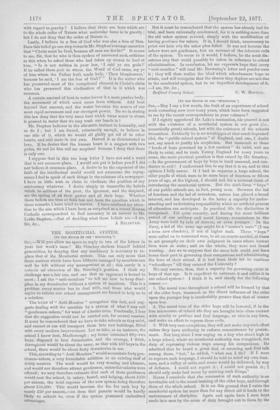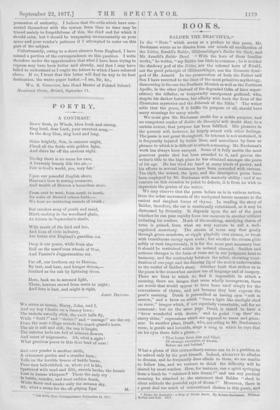[TO THE EDIT011, OF THE "SPECTATOR:] SIR, —May I say a
few words, the fruit of an experience of school work extending now over many years, which have been suggested to me by the recent correspondence in your columns ?
If I rightly apprehend 1r. Lake's contention, his quarrel is not with the existence of a monitorial system in our great (i.e., numerically great) schools, but with the existence of the schools themselves. Evidently he is no worshipper of that much bepraised idol, the "public-school system" of England, and can, I doubt not, say much to justify his scepticism. But inasmuch as these "herds of boys governed by a few masters" do exist, and are likely to exist, and to train Young England for many years to come, the more practical question is that raised by Mr. Strachey, —Is the government of boys by boys in itself unsound, and Con- ducive to evil ? I understand him to say that it is so, and to this opinion I fully assent. If I had to organise a large school, the elder pupils of which were to be mere boys of fourteen or fifteen years of age, at the highest, I should not for a moment think of introducing the monitorial system. But tho sixth-form " boys" of our public schools are, in fact, young men. Between the lad of fourteen and the lad of seventeen, nature has placed a broad interval, and has developed in the latter a capacity for under- standing and undertaking responsibility which no artificial process of education can anticipate. In practical life the distinction is recognised. Till quite recently, and during the most brilliant period of our military and naval history, commissions in the Army were held by lads of sixteen, or even younger. In the Navy, a lad of the same age might be a "master's mate" ([use a term now obsolete), if not of higher rank. These " boys " were called on to command men, to sit on courts-martial, at times to act promptly on their own judgment in eases where human lives were at stake ; and on the whole, they were not found wanting. Are we to suppose that the same lads could not have borne their part in governing their companions and administering the laws of their school, if it had been their lot to continue "schoolboys" till they entered the University ?
We may assume, then, that a capacity for governing exists in boys of that age. Is it expedient to cultivate it and utilise it in our school system ? I think it is, and chiefly for the following reason :- 1. The moral tone throughout a school will be formed by that of the elder boys, inasmuch as the direct influence of the elder upon the younger boy is incalculably greater than that of master upon boy.
2. The moral tone of the elder boys will be lowered, if in the free intercourse of school life they are brought into close contact with cruelty or profane and foul language, or vice in any form, and make no effort to repress these evils.
3. With very rare exceptions, they will not make any such effort unless they have authority to enforce remonstrance by punish- ment. Not long since I was urging on a boy who stood high in a large school, where no monitorial authority was recognised, the duty of repressing vicious ways among his companions. He admitted that be heard a great deal of swearing and foul talk among them, 'but," he added, "what can I do ? if I were to reprove such language, I should be told to mind my own huai- ness, and a volley of oaths and worse would be delivered, by way of defiance. I could not report it ; I could not punish it; I should only make bad worse by noticing such things." Hence I conclude that the concession of such authority is aa invaluable aid to the moral training of the elder boys, and through them of the whole school. It is on this ground that I value the monitorial system far more than for any direct aid it lends to the maintenance of discipline. Again and again have I seen boys made into men by the sense of duty brought out in them by the possession of authority. I believe that the evils which have con- nected themselves with the system from time to time may be traced mainly to forgetfulness of this, the chief end for which it should exist, but I should be trespassing unwarrantably on your space and your reader's patience if I attempted to enter on this part of the subject.
Unfortunately, owing to a short absence from England, I have missed a portion of the correspondence on this question. I write therefore under the apprehension that what I have been trying to express may have been better said already, and that I may have failed to understand as I ought the letters to which' have referred above. If so, I trust that this letter will find its way to its best destination, the waste-paper basket.—I am, Sir, &c.,































 Previous page
Previous page